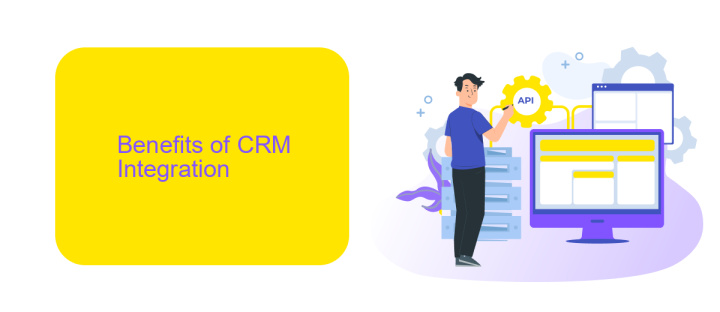Company Data CRM Integration
In today's fast-paced business environment, efficient customer relationship management (CRM) is crucial for success. Integrating company data into your CRM system not only streamlines operations but also enhances customer satisfaction and drives growth. This article explores the benefits of CRM integration, the challenges involved, and best practices to ensure a seamless and effective implementation.
Introduction
In today's competitive business landscape, integrating company data with Customer Relationship Management (CRM) systems has become essential for achieving operational efficiency and enhancing customer interactions. By consolidating data from various sources into a unified CRM platform, businesses can gain valuable insights, streamline processes, and provide personalized experiences to their customers. This integration is not just a technological upgrade but a strategic move to stay ahead in the market.
- Improved data accuracy and consistency
- Enhanced customer insights and segmentation
- Automated workflows and reduced manual tasks
- Better collaboration across departments
- Increased customer satisfaction and loyalty
One of the effective tools for facilitating CRM integration is ApiX-Drive. This service allows businesses to effortlessly connect their CRM systems with other applications, ensuring seamless data flow and synchronization. By leveraging ApiX-Drive, companies can automate data transfers, reduce errors, and focus on strategic initiatives rather than manual data management. As a result, integrating company data with CRM systems not only optimizes operations but also drives business growth.
Benefits of CRM Integration

Integrating CRM systems into your company’s operations can offer numerous benefits, significantly enhancing efficiency and productivity. One of the primary advantages is the centralized storage of customer data, which allows for seamless access and management. This leads to improved customer relationships as all interactions and transactions are tracked and easily retrievable, enabling personalized communication and service. Moreover, CRM integration can automate various tasks, reducing manual effort and the likelihood of errors, thus allowing your team to focus on more strategic activities.
Another significant benefit is the ability to generate detailed analytics and reports. With integrated CRM systems, businesses can gain valuable insights into customer behavior, sales trends, and overall performance. These insights can drive informed decision-making and strategic planning. Tools like ApiX-Drive facilitate the integration process by offering a user-friendly platform to connect various applications and automate workflows without the need for extensive technical knowledge. This ensures that businesses can quickly and efficiently leverage the full potential of their CRM systems, leading to enhanced operational efficiency and growth.
Types of CRM Integrations

Integrating your CRM system with other tools and platforms can significantly enhance its functionality and streamline your business processes. There are several types of CRM integrations that you can consider to optimize your operations.
- Email Integration: Connect your email platform with your CRM to automatically log emails, schedule follow-ups, and manage customer communications in one place.
- Social Media Integration: Integrate social media channels to track customer interactions, manage social campaigns, and gather insights directly in your CRM.
- Marketing Automation Integration: Link your CRM with marketing automation tools to synchronize customer data, track campaign performance, and automate marketing workflows.
- Customer Support Integration: Connect your CRM with support platforms to manage tickets, track customer issues, and improve response times.
- Data Integration: Use tools like ApiX-Drive to automate data transfer between your CRM and other business applications, ensuring data consistency and reducing manual entry.
By leveraging these CRM integrations, businesses can enhance their customer relationship management, improve operational efficiency, and gain deeper insights into customer behavior. Selecting the right integrations tailored to your specific needs will help you maximize the value of your CRM system.
Implementation and Best Practices

Implementing a CRM integration for company data requires careful planning and execution to ensure seamless data flow and optimal performance. Start by assessing your current systems and determining the specific data points that need to be integrated. It's crucial to set clear objectives and define the scope of the integration project.
Next, choose a reliable integration platform that supports your CRM and other business applications. ApiX-Drive is an excellent option, offering a user-friendly interface and robust functionality to automate data transfer between systems. This tool can help streamline the integration process and reduce the need for manual data entry.
- Identify key data points and map them between systems.
- Utilize ApiX-Drive for automated data synchronization.
- Test the integration thoroughly before full deployment.
- Monitor performance and make necessary adjustments.
Regularly review and update the integration to accommodate changes in business processes and technology. By following these best practices, you can ensure a smooth and efficient CRM integration, leading to improved data accuracy and better decision-making.
Conclusion
Integrating Company Data with a CRM system is a pivotal step towards enhancing business operations, improving customer relationships, and driving growth. By consolidating data from various sources into a unified platform, companies can gain valuable insights, streamline workflows, and make data-driven decisions. The process, while intricate, offers substantial rewards in terms of operational efficiency and customer satisfaction.
Utilizing services like ApiX-Drive can significantly simplify the integration process. ApiX-Drive offers robust tools that facilitate seamless data transfer between different systems, minimizing the need for manual intervention and reducing the risk of errors. This automation not only saves time but also ensures data accuracy and consistency across platforms. Ultimately, a well-integrated CRM system can become a cornerstone of a company's strategy, enabling better decision-making and fostering stronger customer relationships.
FAQ
What is CRM integration?
Why is CRM integration important for my company?
How can I automate the integration process?
What are the challenges of CRM integration?
How do I choose the right integration tool for my CRM?
Apix-Drive is a simple and efficient system connector that will help you automate routine tasks and optimize business processes. You can save time and money, direct these resources to more important purposes. Test ApiX-Drive and make sure that this tool will relieve your employees and after 5 minutes of settings your business will start working faster.

